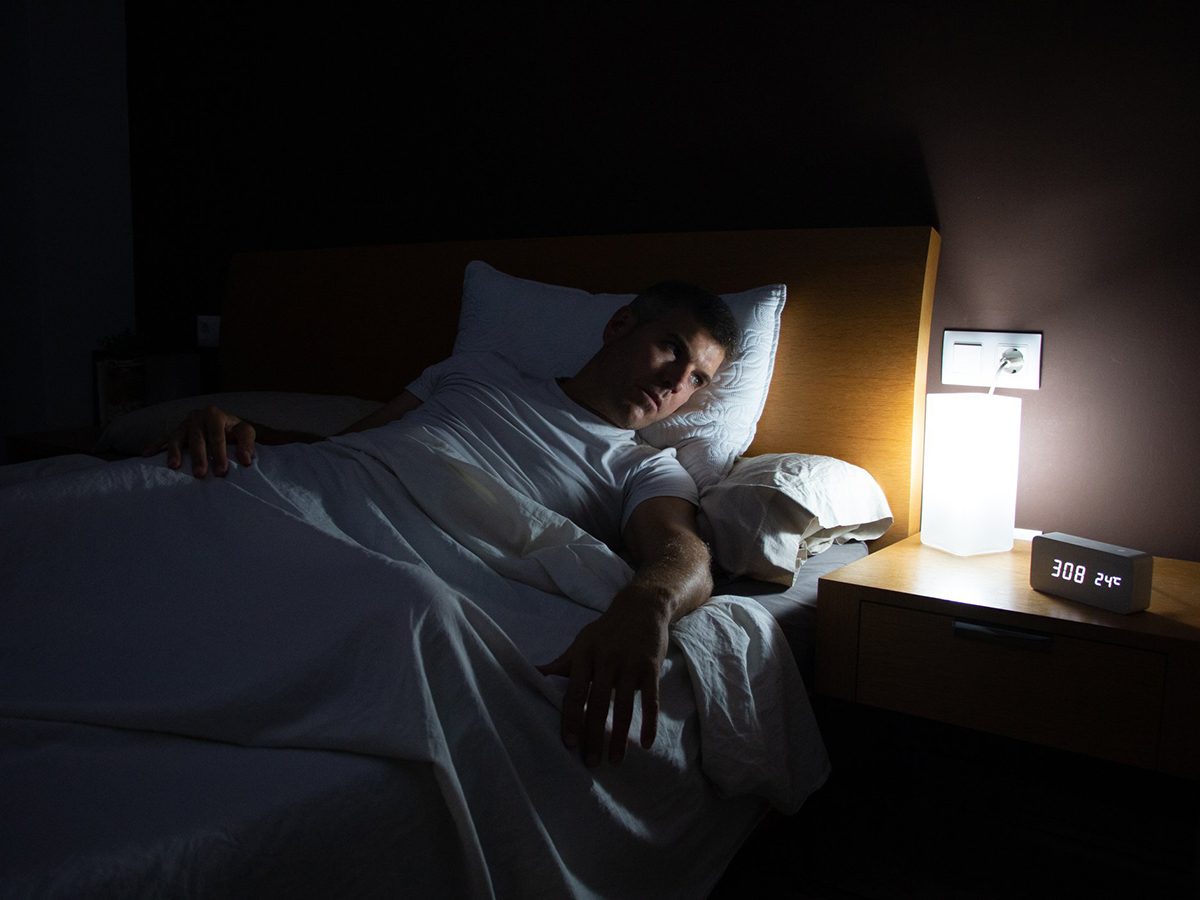Waking Up With Anxiety at Night? Here’s What Experts Recommend

Here's a look at the causes, treatments, symptoms and ways to prevent anxiety at night.
How to sleep with anxiety
No one gets a good night’s sleep every night. But sometimes a restless time in bed can be caused by worry and stress that builds up over time, leading to anxiety at night.
Night time anxiety can cause you to wake up at an unusually early hour (say, 3 a.m.), feel like you haven’t had enough sleep, and then feel pressure to go back to sleep, explains Virginia Runko, PhD, a behavioral sleep medicine specialist and psychologist in Washington, D.C.
You may toss and turn as your mind dwells on your worries from the day before, then races off thinking about a crisis you can’t control. If you struggle with insomnia and have anxiety, you may have a pattern of waking up unusually early and having trouble getting back to sleep. (Here are the seven types of insomnia that can keep you up at night.)
Called sleep-maintenance insomnia, it affects more women than men. You typically start to worry about getting back to sleep at a reasonable time, and you also may have thoughts that become more dire and even irrational.
Anxiety can happen at any time of the day, including the morning, afternoon and at night. Typical symptoms of anxiety can include nervousness, worrying, the inability to focus, as well as trouble falling or staying asleep. (The season might be making you more stressed. Autumn anxiety is real—here’s how to cope.)
Sometimes, if you experience anxiety during the night, you may even have a nocturnal panic attack. These panic attacks have the same symptoms as a daytime attack, ranging from heart palpitations to experiencing feelings of extreme fear. (Learn the difference between an anxiety attack vs. panic attack.)
Here’s everything you need to know about this type of anxiety, why it happens at night, and how to cope with it.

Causes of anxiety at night
When you wake up in the middle of the night with anxiety, the cause may be an internal or external stressor. Here are a few common ones:
Stress
Your stress levels may be at a high right now because of the COVID-19 pandemic, social unrest and the upcoming election. You also may experience higher levels of stress at home if you are dealing with unemployment, financial instability or juggling childcare while working from home.
Worries are almost primed to reach a fever pitch overnight. “Some research shows that activity in your brain’s frontal lobe—the area responsible for rational thinking, executive functioning, and thought and behaviour inhibition—dials down overnight,” explains Runko.
If you have anxiety and are dealing with loads of stress, this stress can manifest itself during the nighttime as your mind is racing. The body begins to “prime” itself in a fight-or-flight response, which often causes what is known as an adrenaline rush. If you experience this at night, it makes it even more difficult to fall back asleep. (Try these 30+ stress management tips from the experts.)
Drinking alcohol
Drinking may have gone up in COVID-19 times, and alcohol isn’t good for your sleep, says Alex Dimitriu, MD, a dual board-certified doctor in psychiatry and sleep medicine in Menlo Park, California.
Alcohol may send you to dreamland quickly, but it also disrupts sleep in the second half of the night. You may wake up in the middle of the night, giving space and oppourtunity for your mind to start to wander and worry.
Checking your phone
In a 2018 study of young adults published in PLoS ONE, one in eight were using their phones in the middle of the night, specifically three to five hours after going to bed.
Being glued to your phone—especially if you’re checking potentially triggering content—contributes to anxiety, says Dr. Dimitriu.
Poor sleep habits
With COVID-19 throwing everyone’s normal schedule out the window, “you may be doing things that make it more likely you’ll wake up in the middle of the night, like going to bed really early out of boredom,” says Runko. (Follow these 11 weird tricks that really do help you go to sleep.)
Treatments
The key to treating your anxiety at night is to identify its root cause. Sometimes, there are medical conditions that can lead to anxiety symptoms, such as chronic pain, irritable bowel syndrome, hyperthyroidism, heart disease and diabetes. (Here are 10 possible medical reasons why you can’t sleep.)
If you have any of these preexisting conditions or suspect you do, it’s important to discuss with your doctor how to effectively treat them, which may help alleviate some anxiety.
Medication
Working with your doctor or a psychiatrist, you may be prescribed a variety of medications if the problem stems from anxiety. These may include selective serotonin reuptake inhibitors (SSRIs), which increase the presence of serotonin, the “feel-good” chemical, in the brain.
Serotonin works as a mood stabilizer and promotes feelings of happiness.
Another common anxiety medication option is serotonin-norepinephrine reuptake inhibitors (SNRIs), which works in a similar way to SSRIs. These drugs increase the levels of both serotonin and norepinephrine—associated with alertness and energy—in the brain. (This is what you need to know about generalized anxiety disorder.)
Psychotherapy
Cognitive behavioural therapy (CBT) helps you change thinking patterns that feed anxiety. It also teaches behavioural strategies that reduce anxiety and introduces coping options. Improvements with CBT can be seen in as soon as 12 to 16 weeks. (Learn about the 19 things you should do all day long for better sleep tonight.)
How to prevent night time anxiety
Meditation
Practicing mindful awareness can help improve your sleep quality, and reduce symptoms of insomnia and depression, finds a 2015 study in JAMA Internal Medicine.
Exercise
Physical activity reduces anxiety overall by increasing the level of neurochemicals in your brain that keep your mood up. Exercise also promotes sleep quality and how much sleep you get. (Here are eight steps to getting back into shape.)
Sleep schedule and hygiene
Improving sleep hygiene habits, which includes going to bed and waking up at a consistent time daily, can help improve your ability to stay asleep. It’s important to set up a bedroom that facilitates sleep (a dark, cool, quiet room, for instance). This will help limit stimuli that could wake you up at night and make it easier to fall asleep. (Learn why dream deprivation is just as unhealthy as sleep deprivation.)
Journaling
Try a worry control procedure, suggests Runko. At least two hours before bedtime, write out your worries or what’s making you particularly anxious in a journal.
“This allows you to process these thoughts earlier in the day, so you don’t feel like you have to go through it in the middle-of-the-night,” she says. And, write down the concrete steps you will take to deal with those worries.
For instance: You’re worried about your finances, so you’ll plan on coming up with a budget. If worries are more abstract, then a professional may be able to help guide you in CBT to help reframe your thoughts so they don’t weigh as heavily on you.
Still waking up? Runko advises telling yourself that you already thought about this problem, it’s in your worry journal, and you’ll revisit it tomorrow during the next scheduled worry time.
If it’s a “new” worry, go ahead and quickly scribble in your journal so that you can come back to it tomorrow.
What to do when you wake up anxious at night
Get out of bed. This is a strategy for dealing with insomnia and sleep-maintenance insomnia that experts like Runko teach their patients, and it comes from CBT for insomnia (CBT-1).
“If you’re anxious, you’re physiologically more awake, which can lead to conditioned arousal,” she says.
Move away from your bed and try a calm, sedentary activity that you consider to be a pleasant distraction. That can include TV (yes, really, but avoid triggering or scary programs), meditation, or reading a book.
Once you are again drowsy, go back to bed. (Here are 12 ways to wake up happier tomorrow morning.)
When to seek professional help
If nighttime wake ups are frequent, bothersome, or impact your quality of life, don’t hesitate to seek help from a therapist or a sleep medicine specialist. If you have anxiety, treatment may also include medication, like SSRIs or SNRIs, as previously discussed.
You should also focus on healthy lifestyle measures, like diet and nutrition, physical activity, mindfulness, and relaxation exercises. Your doctor, therapist, psychiatrist, or sleep medicine specialist can help you come up with a plan that will work for you.
Sources:
- Anxiety.org: “Do I Have Anxiety?”
- Anxiety and Depression Association of America: “Generalized Anxiety Disorder”
- Anxiety and Depression Association of America: “Sleep Disorders”
- National Institute on Alcohol Abuse and Alcoholism: “Director’s Blog: Alcohol poses different challenges during the COVID-19 pandemic”
- American Psychological Association: “What is Cognitive Behavioral Therapy?”
- Anxiety and Depression Association of America: “Medication”
- Anxiety.org: “Anxiety Treatments: Know Your Options”
Next, try these seven morning brain exercises to clear your mind.






